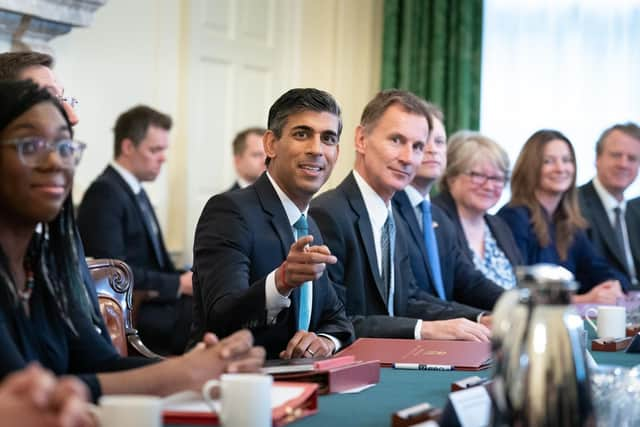The electorate will judge this Government against the levelling up mandate - Justine Greening
Britain had been told to brace itself for tax rises and spending restraint. What Hunt served up felt like a harsh lesson in economic reality.
Unlike in most budget statements, this time there were few rabbits pulled out of the Treasury hat. Extra investment in schools and the NHS must be welcomed given the pressures both face. Confirmation that a future round of the Levelling Up Fund will be maintained, alongside funding local infrastructure projects, was also welcomed.
Advertisement
Hide AdAdvertisement
Hide AdThere was some politics at play, as a Conservative Chancellor attempted to outflank his Labour opposition by increasing taxes on the highest earners, whilst also pushing back spending cuts to take place after any election, thereby also putting pressure on the Labour Party to either accept those departmental cuts, borrow more or set out extra tax rises.


In the days to come, the details of the Autumn Statement and the accompanying Office for Budget Responsibility report will be heavily scrutinised. It may well be that in the weeks ahead, the budget will be remembered as much for the areas of Government spending left out of the Autumn Statement and facing deeper public spending cuts, as those included and protected.
Yet the challenge Mr Sunak’s Government faces is not only to set out this week’s plan to navigate the turbulent economic waters we already face, but also its clear plan for the longer term and levelling up Britain.
People need to know why the sacrifices they are asked to make today will be worth it for a better future, and how that better future is to be delivered.
Advertisement
Hide AdAdvertisement
Hide AdThe push for a growth strategy means the case for levelling up is an economic one as much as anything else. Lives on track, succeeding and contributing also means an economy on track with skilled workers to take advantage of skilled jobs and then progress in their careers.
If Britain wants to transform its public finances for the better for the longer term, then breaking the cycle of weak social mobility is crucial. It won’t happen overnight, and it’s a generational challenge, but failing to tackle this ingrained issue isn’t an option any more if we’re to improve productivity.
It was less than three years ago this Conservative Government was elected on a mandate to level up Britain. In places like Yorkshire, traditionally Labour voters switched in unprecedented numbers to give Boris Johnson a landslide victory.
And it’s that levelling up mandate the electorate will judge this Government against at the next election. Labour may now be well ahead in the polls but much of the outcome of the next election will depend on which of the two main parties voters believe has the best plan on delivering stronger social mobility and levelling up.
Advertisement
Hide AdAdvertisement
Hide AdVoters understand the challenges the Covid pandemic and Russia’s invasion of Ukraine have brought in this Parliament. But fundamentally people still want to see a Britain that emerges from the difficult times we live in that is fairer and better at connecting its people up to opportunities. Levelling up is a precursor for a successful post-Brexit Britain.
So if we’re to truly transform Britain’s future then we need ambition and vision for developing Britain’s talent, whether for children and young people in education or for adults already in the workplace.
Ministers should revisit Sir Kevan Collins’ post-Covid education recovery plan. The startling statistics released this week by the Centre for Social Justice, showing a 82 per cent rise in children persistently absent from school post-Covid, underlines how we need a plan to make sure our next generation’s learning isn’t permanently damaged by the pandemic.
And let’s see the apprenticeship levy finally made more flexible for employers to invest in developing skills, rather than continuing to see £1bn of levy going unspent every year because the rules are too rigid.
Advertisement
Hide AdAdvertisement
Hide AdMinisters are right to say we shouldn’t duck all the difficult fiscal decisions now to pass on Britain’s debts to future generations, but it’s similarly a burden on them and our nation to leave talent under-developed, opportunities out of reach and the country’s potential unrealised. Britain must have a plan to deal with this.
There’s nothing preordained about the future. It’s the choices we make today that shape what happens tomorrow.
We’ve been at a moment like this before. After World War II, with all the challenges Britain faced then, our political leaders still found a way to build political consensus and establish the NHS and welfare state.
These were monumental achievements that shaped Britain and demonstrated our values. They weren’t put in the ‘too hard’ box by politicians and neither should levelling up be today.
Advertisement
Hide AdAdvertisement
Hide AdIt’s again a defining moment for Britain, a time when we’ve reached a fork in the road. We have to rise to this challenge that Britain faces on improving social mobility. We simply cannot afford to waste talent in the future as we have in the past.
Our country faces a difficult time ahead but we have all got to have legitimate hope for a better future. The long term vision and plan to deliver a levelled up Britain still needs to be set out. It’s what we need next from the Sunak Government.
Justine Greening, who was born and raised in Rotherham, is a former Secretary of State for Education.